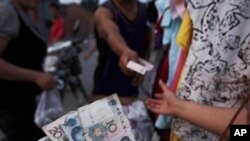China raised its official loan interest rate by a quarter of a percent, hiking one-year lending rates to 5.56 percent and raising deposit rates from 2.25 percent to 2.5 percent.
Pieter Bottelier, Senior adjunct professor of China studies at Johns Hopkins University says China raised the interest rates to try to ward off some serious economic problems. Those problems, he says, are much higher inflation than the government feels comfortable with and a property bubble of quite significant proportions and potentially dangerous for the economy. He says the interest rate hike reflects a high level of concern about inflation and was an effort to bring an overheating economy down to earth.
Is the property bubble you mentioned as serious as believed, or is it just something that would self correct?
Oh! It is undoubtedly serious. It's a major phenomenon, but it's not national. It's essentially limited to the major cities on the east coast and a few tier one interior cities and Hainan Island. The national averages do not show the bubble phenomenon.
The World Bank has now lowered its outlook for next year in China and across East Asia. They are urging officials in the region to curb inflation and ward off those asset bubbles. Do you think this was partly behind China's hiking interest rates at this time?
I think that's all part of it. It's very complex, but the interest rate adjustment is, I think, clearly intended to help cool down the economy and achieve a soft landing. The economy had been overheating since the second-half of 2009. But, by itself, if will not accomplish that, that miracle. There is, in my view, a high probability that China's economy will continue to grow fairly fast, but not at these terrible rates we have seen in recent years. My expectation is that the growth rate, partly because of natural pressures, partly because the government, I think, wants to achieve it, will come down in the next several years to a more sustainable level of around 7 percent.
I take it then that you have come to the conclusion that the interest rate adjustment has more to do with internal affairs in China and that the currency exchange rate is not connected and is something that will just take time to settle?
The adjustment in interest rates is not going to do anything automatically for the exchange rate. If they want to continue moving in the right direction and achieve greater independence for domestic monetary policy they will have to make the rate more flexible. That's what they said they would do. But, there's no immediate connection between the interest rate adjustment and the exchange rate.




